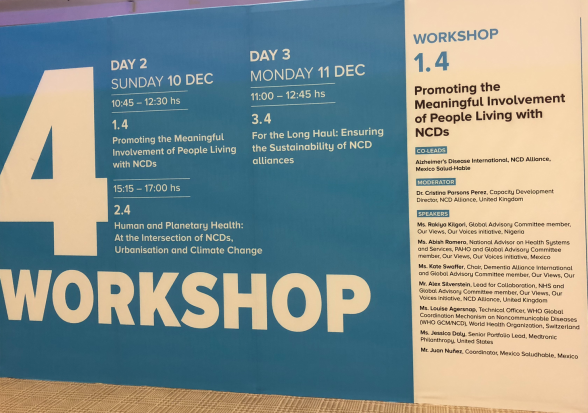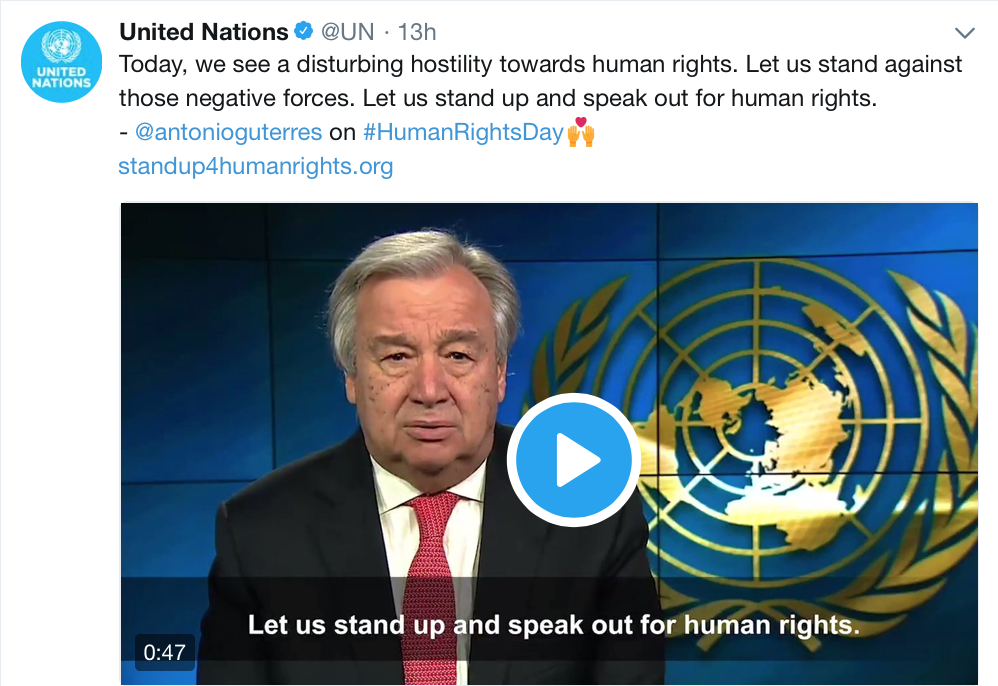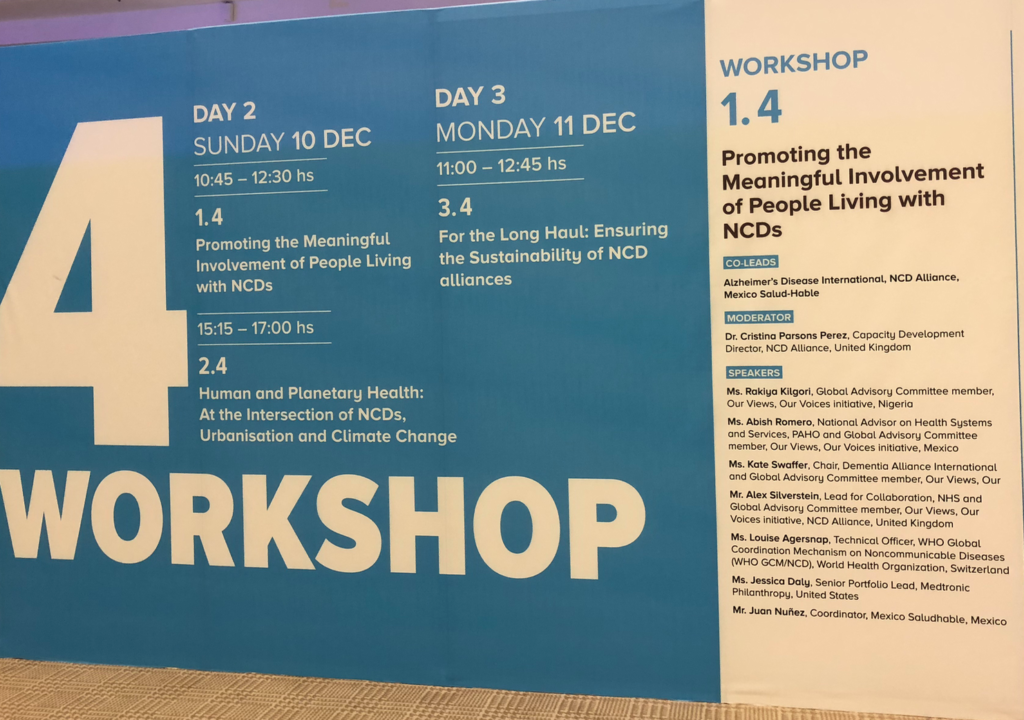 Today the world celebrates and acknowledges the 70th Human Rights Day, and it was fitting that as DAI's Chair and CEO, I presented on Day 2 at the NCD (Non Communicable Diseases) Alliance Forum Workshop in Sharjah on the topic of Human Rights and Social Justice. We must all
Today the world celebrates and acknowledges the 70th Human Rights Day, and it was fitting that as DAI's Chair and CEO, I presented on Day 2 at the NCD (Non Communicable Diseases) Alliance Forum Workshop in Sharjah on the topic of Human Rights and Social Justice. We must all #standup4humanrights and I was truly shocked by one of the tweets from the UN, as pictured here:
The United Nations website states the following about Human Rights Day:
"Human Rights Day is observed every year on 10 December – the day the United Nations General Assembly adopted, in 1948, the Universal Declaration of Human Rights. This year, Human Rights Day kicks off a year-long campaign to mark the upcoming 70th anniversary of the Universal Declaration of Human Rights, a milestone document that proclaimed the inalienable rights which everyone is inherently entitled to as a human being -- regardless of race, colour, religion, sex, language, political or other opinion, national or social origin, property, birth or other status. It is the most translated document in the world, available in more than 500 languages." Source: http://www.standup4humanrights.org/en/
Promoting the meaningful involvement of people living with NCD's
Thank you to the NCD Alliance for this invitation to speak today. I'd like to start by briefly outling the global statistics on dementia, and a some background of DAI.
- > 50 million people in the world estimated to be living with dementia (WHO, 2017)
- These numbers are expected to triple by 2050, to152 million (WHO, 2017)
- 1 new diagnosis globally every 3.2 seconds (WHO, 2015)
- > 130 types or causes of dementia
- Alzheimer’s Disease makes up 50-70% of all dementias
- Dementia is a terminal, progressive chronic illness
- No cure
- No disease modifying medication
- Some medication for AD that may slow the progression
- Medical model of care no longer appropriate
Many of you may not have heard of Dementia Alliance International (DAI), which was established on January 1 , 2014. DAI is a global advocacy and support group, of, by and for people with dementia, and the peak body for, and global voice of people with dementia, and represents members in 44 countries. We are also a registered 501c3 charity in the USA.
DAI is in a strategic but autonomous partnership with Alzheimer’s Disease International who also are our pnly sponsor, and DAI was completely self funded for the first 1.5 years, and still relies on some self funding for much of its work.
Eight people with dementia co-founded DAI. Some of the reasons were to ensure people with deMEntia have a voice of their own, to empower others with deMEntia to live positively with it, rather than just go home and die from dementia, to provide grass roots support through peer-to-peer support groups and other online activities, to promote self advocacy, and importantly, to lobby locally, nationally and globally for a right based approach to dementia.
The voices of people living with NCD’s
The voices of people living with NCD’s are imperative, and of course, include people with dementia. One of my personal goals is also to empower people from as many countries as possible to speak up for themselves. In my book "What the Hell Happened to my Brain: Living beyond dementia" (2014), I talked about the value of really listening to people's stories:
"Before writing and setting up my blog I hadn’t realised how important it might be to create a shared space where other people with dementia could talk of life, illness, dementia and other our ever-deteriorating abilities, where I could discover in the witness of others (readers, rather than critics) how my stories had been heard. The insightful writer Joel Magarey, author of Exposure felt his words had not been rendered alive until acknowledged by the reading and response of his soul mate and lover, whose compassion and timbre with him is described with such gracefulness in the book. He writes:
As I imagine myself saying the words to Penny, they seem to gain the significance I want them to have as if only when I tell her of these solitary experiences will they come to truly exist.”
Such ‘listening’ reading requires philosophical and considerate silence allowing the author to speak to the imagination of the reader, and from the heart. It is not a substitute for more critical reading but can be a valuable source of artistic enrichment. We live until we die. For the most part, I try to live as well as possible, and to enjoy the days I am alive."
This extract seemd important to share, in light of the young speaker yesterday who shared her own personal stories, and resonated with the NCD Alliance publication, Our Views Our Voices, as they seek to the personal stories of people living with any type of NCD.
Living with dementia has further developed my sense of social justice, and I often liken the experience of advocating for my rights (and the collective rights of all with dementia) like Rosa Parks, who refused to sit in the black section of the bus. Dr Martin Luther King Jnr. is another of my mentors, and his quote, "Our lives begin to end the day we become silent about things that matter" is one tht I regularly refer to.
Re-defining dementia
In advocating for dementia, I have seen the need to highlight various definitions, and believe we need to move away from the purely medical definition: “Dementia is a syndrome in which there is deterioration in memory, thinking, behaviour and the ability to perform everyday activities.” (Mayo Clinic, 2017).
I therefore feel we must re-define dementia, and offer three alternate examples:
- “We are just changing in ways the rest of you aren’t, we have increasing disabilities, the better for all of us living with dementia. We desperately need others to enable us, not further disable us!” (John Sandblom, 2013)
- “Dementia is a shift in the way a person experiences the world around her/him.” (Dr A Power, 2016)
- “People with dementia have changes in their brain that although progressive, equate to acquired cognitive disabilities.” (Kate Swaffer, 2017)
Following a diagnosis of dementia
What happened to me when I was first diagnosed, which I have termed Prescribed Disengagement®, is not only illogical, it is a reach of human rights, and is still happening today. I was literally told to:
“Go home, give up work, give up study, get my end of life affairs in order, and get acquainted with aged care.”
Dementia is the only illness I know where people are told to go home and prepare to die via aged care rather than fight for their lives! The cost of this Prescribed Disengagement® is a sense of hopelessness, and no sense of being able to live positively and no sense of a future. It makes it easy to assume victimhood and assume learned helplessness, and further disables and disempowers us. It definitely ensures we believe there is nothing we can do to slow the progression.
Why a rights based approach to dementia
We need a rights based approach to dementia becasue we are still applying late stage disease ‘management’ to earlier stage diagnosis, we have ignored human rights in favour of ‘consumer safety’, we have ignored human rights in favour of organisational risk management, and I believe, it’s also been convenient...
On December 10, 1948 the Universal Declaration of Human Rights was adopted by the General Assembly of the United Nations. The UN Convention was (still is) meant to protect every single member of civil society in the world… Including people diagnosed with any type of a dementia, and who have disAbilities caused by the symptoms of their dementia.
67 years later, the Organisation for Economic Co-operation and Development (OECD) report Addressing Dementia: The OECD Response concluded:
“Dementia receives the worst care in the developed world.” (2015)
This OECD report also confirmed why it was necessary to demand a human rights based approach to dementia at the WHO in 2015, which includes full access to the CRPD and rehabilitation. Globally, we are lobbying to phase out all institutional care, and also secure dementia units. Locked facilities or wards simply equate to segregation, based on an illness, and the only other people we lock up 'for their or our safety' are convicted criminals. I also believe:
“There is a systemic and gross underestimation of the capacity of all people diagnosed with deMEntia, even in the later stages of the disease.” (Kate Swaffer © 2014)
Finally, and very importantly, we know that most of the NCD’s are also major risk factors for dementia, and as one of DAI's slogans says, 'Together, we are stronger'.
Thank you.



